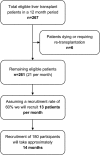Video clinics versus standard face-to-face appointments for liver transplant patients in routine hospital outpatient care: study protocol for a pragmatic randomised evaluation of myVideoClinic
- PMID: 30340637
- PMCID: PMC6195722
- DOI: 10.1186/s13063-018-2953-4
Video clinics versus standard face-to-face appointments for liver transplant patients in routine hospital outpatient care: study protocol for a pragmatic randomised evaluation of myVideoClinic
Abstract
Background: Video clinics, where patients can have a hospital appointment with their clinician from home, are emerging in practice, but their effectiveness is unclear. This study will evaluate whether a video clinic implemented at the University Hospitals Birmingham (UHB) NHS Foundation Trust improves patient satisfaction compared to standard face-to-face appointments for liver transplant patients.
Methods: This will be a parallel, two-arm, statistician-blinded, randomised evaluation. Clinically stable liver patients at 1 to 5 years post-transplant (n = 180) will be randomised in equal numbers to video clinic appointments (intervention) or standard face-to-face appointments (control). The intervention group will have outpatient appointments from home via a secure video link accessed through the UHB patient portal. All patients will complete baseline questionnaires before randomisation and electronic follow-up questionnaires after each follow-up appointment during the subsequent 12 months. The primary outcome is the difference in scores between groups for three domains of patient satisfaction, namely 'convenience of location', 'getting through to the office by phone' and 'length of time waiting' (modified Visit-Specific Satisfaction Instrument). Secondary outcomes include quality of life (EQ-5D-5 L), costs, clinical contacts and user experience. Statistical analysis will be descriptive and performed on an intention-to-treat basis. The primary outcome will be analysed using baseline and 3-, 6-, 9- and 12-month questionnaires (according to patient follow-up appointment frequency) and comparisons made between study arms. A within-trial cost consequences analysis will be undertaken on the economic data. Patients (n = 8), carers/family members (n = 6) and health professionals (n = 14) will be interviewed about the experience of video clinics and the interviews will be analysed using thematic analysis.
Discussion: This study will allow an in depth understanding of whether video clinics can improve patient satisfaction with their care. In addition, the intervention could save patients time and costs, removing the need to travel long distances for outpatient appointments. Video clinics may be applicable to a wide range of other clinical settings and health conditions. The study has been approved by the NHS Health Research Authority and a National Research Ethics Committee (Ref: 17/WM/0338) and research governance approval has been obtained from UHB (Ref: RRK6080).
Trial registration: ISRCTN: 14093266 (25/03/2018; retrospectively registered).
Keywords: Economic analysis; Liver transplant; Patient satisfaction; Randomised evaluation; Video clinic.
Conflict of interest statement
Ethics approval and consent to participate
Study protocol version 1.2 (25/09/2017) has been approved by the NHS Health Research Authority and received a favourable ethical opinion from the West Midlands Solihull Research Ethics Committee on October 24, 2017 (Ref: 17/WM/0338). Research governance approval was obtained from University Hospitals Birmingham NHS Foundation Trust in February 2018 (Ref: RRK6080). The study is sponsored by the University of Birmingham. Responsibility for the conduct of the research, analysis of the data and publication of the findings will remain with the research team and steering group.
Consent for publication
Not applicable.
Competing interests
The authors declare that they have no competing interests.
Publisher’s Note
Springer Nature remains neutral with regard to jurisdictional claims in published maps and institutional affiliations.
Figures
References
-
- Department of Health. 2010 to 2015 Government Policy: Long Term Health Conditions. https://www.gov.uk/government/publications/2010-to-2015-government-polic.... Accessed 20 Jan 2018.
-
- Department of Health. The Government’s Mandate to NHS England for 2017–18. https://www.gov.uk/government/uploads/system/uploads/attachment_data/fil.... Accessed 20 Jan 2018.
-
- Honeyman M, Dunn P, McKenna H. A Digital NHS? An Introduction to the Digital Agenda and Plans for Implementation. London: Kings Fund; 2016.
-
- Wachter RM. Making IT Work: Harnessing the Power of Health Information Technology to Improve Care in England. https://www.gov.uk/government/uploads/system/uploads/attachment_data/fil.... Accessed 15 Mar 2018.
Publication types
MeSH terms
LinkOut - more resources
Full Text Sources
Medical




